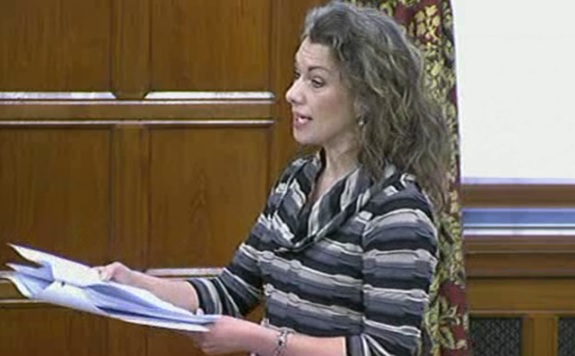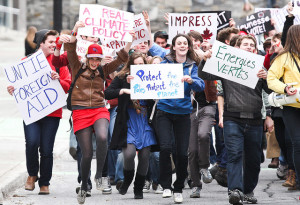Votes at 16 will not solve the problem of youth disengagement overnight, but it will help us to address the issue
Last week MPs debated the the case for lowering the UK’s voting age to 16, following Scotland’s decision to allow 16 and 17-year-olds to vote in the independence referendum. Sarah Champion MP initiated the debate, arguing in favour of the reform on the basis that young people demonstrate considerable enthusiasm for participating in politics. This post is an edited version of her speech, published as part of our series on youth participation.

Sarah Champion MP made the case for votes at 16 in a Westminster Hall debate. Credit: Houses of Parliament
There are 1.5 million 16 to 17-year-olds in the UK and they are missing out on the vote. There are so many things a person can do when they become 16. They can leave school to enter work, give full consent to medical treatment, consent to sexual relationships and even get married, if they choose to, with parental permission. Sixteen-year-olds may also join the armed forces, change their name by deed poll, obtain tax credits and welfare benefits in their own right, become a member of a trade union or co-operative society, and even become the director of a company. On top of all that, 16-year-olds in work are required to pay income tax and national insurance contributions, yet those 16-year-olds paying taxes are not allowed a say in how they are spent.
Moving away from the status quo is difficult, as history recognises. In 1918, votes for women was not a popular cause, but the minority who knew it was right paved the way for millions of British women, who have gone on to not only cast their vote, but regard doing so as the norm. Tracing history further back, much the same could be said of the Chartist movement, which fought for the vote for the working classes. Once again, at the time, that idea was regarded with animosity and was resisted, but society quickly came to see the opening up of the vote as fair and just. The time is right to open the democratic system even further, and to include 16 and 17-year-olds among the group of people who are able to vote. It would be a bold and pioneering move that would really show how far we have come as a country.
I have heard from many 16 and 17-year-olds throughout the country on why securing the vote is so important to them, and particularly from the young people of the Rotherham youth cabinet, who came to my office recently to share their thoughts on voting at 16. At the meeting, Oliver Blake, who was previously our Member of the Youth Parliament, said:
“I feel that the major issue preventing people from supporting the Votes at 16 campaign is that people say you’re not mature enough. I don’t feel that argument is valid. You have people at all ages who don’t use their vote wisely; you can see this by the number of people voting for extremist parties or joke candidates, but you don’t exclude them from using their vote. I want to be able to vote because I want a say in my future, and I know I’ll use that vote responsibly.”
Rotherham’s current Member of Youth Parliament, Ashley Gregory, expressed his desire to help choose his future by voting now. He believes that issues of direct relevance to young people, such as university tuition fees and education, demonstrate his case. At our meeting, he said:
“I find it difficult to hear MPs having conversations about what the level of tuition fees will be, how higher education is funded or even what curriculum we study in school without being…a legitimate part of that conversation. These are decisions that affect me, but I’m not allowed a voice on them.”
The arguments in favour of voting at 16 are varied, but each in its own right is strong, from the argument that allowing 16 and 17-year-olds to vote empowers them to engage with the political system, to the argument that young people voting would lead to a fairer and more inclusive youth policy. Furthermore, there is the argument that young people should not be expected to contribute to society through taxation as members of the armed forces, or by parenting children, without having a say in how that society is governed. Another persuasive argument is that the low turnout of younger people at elections might be dealt with by engaging them earlier in the political process. Taken individually, each of those arguments is forceful, but collectively they make a robust case for reform.
I recognise that introducing voting at 16 is a bold and radical proposal, but it is an opportunity to invigorate a new generation of politically active and engaged citizens, and that would create a more open and fair political system. Due to new technologies, young people are more informed than ever before, and more able to seek out information and to campaign on issues that affect them.
In the information age, when anyone is able to find out about an issue at the touch of a button, it is not surprising that more young people than ever are expressing a desire to engage with the political system. There is, however, a flipside to that. While we must celebrate the fact that many young people are choosing to engage actively with politics, we must also be cautious, because there are problems in the system that need fixing. Those problems will not be fixed overnight, but voting at 16 might help to address them.
Opening up democracy to young people is an important way of confronting the democratic deficit faced in the UK. Electoral turnout in the UK has been on a downward trend since 1950, when 84% of the population turned out to vote; turnout was only 65% in the most recent general election. Membership of our political parties has fallen; the Conservative party has gone from being 3 million strong in 1950 to having only 100,000 members today. At the most recent elections, only 44% of those aged between 18 and 24 voted. Rather than turn our backs on the problem, we must confront it.
We see in Scotland the impact that allowing 16 and 17-year-olds to vote in the referendum is having on their political engagement. Young people are often featured on the news or in discussion programmes, debating their opinions on Scottish independence. It inspires me to see those young people discussing the issues and taking a stance. The validity of their position is not for me or anyone else to judge, but their engagement with the debate is brilliant to see, and it can teach us lessons about how an inclusive politics is an attractive and fair politics.
This argument applies more broadly. At the heart of the issue is the notion of civil liberties. The debate is not about whom a 16 or 17-year-old votes for, but about recognising their maturity and providing them with a vote, and about a society building them up to use that vote to the best of their ability. Ultimately, this should not be for anyone except 16 and 17-year-olds themselves to decide on. If they feel that they are mature enough to have a vote, we as politicians and as a society should trust our young people enough to allow them to exercise it. I have read that public opinion is against the votes at 16 campaign, but it is not public opinion that matters so much as the opinion of 16 and 17-year-olds. It is their opinion, rather than those of others, that we should listen to and act on. Young people are rightly calling for the right to vote.
The Votes at 16 Coalition, led by the British Youth Council, has been campaigning for votes at 16 for 10 years, backed by 16 and 17-year-olds across the country. As recently as November 2013, the UK Youth Parliament voted to make the issue of votes at 16 its national campaign, after balloting some 478,000 young people nationally. The campaign was then chosen in the Youth Parliament’s annual debate in the House of Commons. Members of the Youth Parliament are democratically elected by young people in their constituency, so the fact that votes at 16 was voted to be their priority campaign shows just how important the issue is for young people nationally.
The strength of feeling is clear, and it is represented not only by other young people across the country but by young people’s organisations. London Youth, the National Union of Students, the Scottish Youth Parliament and the British Youth Council are only a small sample of the young people’s organisations that are actively speaking out in support of the campaign.
Last year, Newham college held a discussion group on voting at 16, to which students of all ages and backgrounds contributed. That debate found, once again, that the majority of students were in favour of reducing the voting age to 16. I am told that much of the discussion focused on the right level of maturity required to vote. While some students argued that 16 was too young, many argued that people matured at different rates, so having the option to vote younger was important.
It appears that, if you ask 16 and 17-year-olds whether they should be allowed to vote, the majority will consistently reply that they should. Opponents of voting at 16 express concerns about undue influence over a 16-year-old’s vote, especially from parents and peers. That should not be a reason to turn down the opportunity for 16 and 17-year-olds to vote, but an argument for improving the information and support available to young people in the lead-up to their first vote. If young people overwhelmingly argue that they want to vote, turning it down due to the impact of their parents seems unfair, unreasonable and, to be quite honest, patronising.
Toni Paxford, a member of Rotherham’s youth cabinet, told me that, for her, the issue was not necessarily the signal that getting the vote would send, but the signal sent by not being given it. She told me of a friend who spends most of her spare time volunteering for charity, as well as of her own experiences raising £3,000 independently for local charities. She argued that by not giving 16-year-olds the vote, society fails to recognise the important contributions that young people can make, and that the failure to recognise those contributions would bring about a culture of apathy among young people.
That point brings me to the contributions made to our society by 16 and 17-year-olds. Toni’s example is one of an incredible volunteering commitment, but such contributions to society come via other routes as well. Sixteen-year-olds can legally become parents, but they raise their children in a society in which they cannot have a say. They can legally go to work and contribute to our economy but are not allowed a say in what our economic policy should be. Perhaps most starkly of all, we let 16-year-olds join our armed forces and thus represent our country, but do not respect them enough to give them a say in our defence policy.
It is not fair or right to allow that set of conflicting messages to continue. We cannot expect 16 and 17-year-olds to contribute to our society through various means—economically, physically, intellectually or socially—in a capacity where we recognise them as an adult, but then give them the democratic rights of a child. That conflict is already being recognised in a number of countries, such as Austria, Bosnia and Herzegovina, and Argentina. We must not allow ourselves to fall behind: we have been pioneers of voting reform in the UK in the past, and I hope that we are open-minded enough now to continue that trend. It is high time that we recognised the clash within our expectations of 16-year-olds. We trust our young people to contribute to society in many ways, so we should start to give them their democratic rights.
If people counter the campaign for votes at 16 with arguments that 16 and 17-year-olds are not mature or responsible enough to vote, I will argue that they should look to the many mature and responsible ways in which 16 and 17-year-olds are already legally entitled and expected to contribute to our society. Allowing voting at 16 would send so many positive signals to our young people. It would say, “We value your voice. We value your contribution. We believe you are responsible.”
A persistent refusal by this Government to permit voting at 16 sends a message to 16 and 17-year-olds that their views on society are not valid. That is not and should not be the case. Our 16 and 17-year-olds will form the next generation of creative thinkers, business leaders, scientists and engineers. We will and do expect them to contribute to our society, both now and in future. Our message to them should be that we expect them to contribute to a society that appreciates them, that welcomes their opinions and that is willing to act to represent their views. If we cannot act to bring that about, it should be no surprise if our young people become alienated from the democratic system.
Already, the political system serves to alienate young people. The average age of an MP is 50, and less than a quarter of MPs are women. We cannot expect young people to engage in politics if it is seen as unfamiliar to and unrepresentative of them. I do not believe that granting votes at 16 is the final or only step needed to engage young people politically, but I believe that it would be a really positive start to the process. We must show young people that we value both their contributions to society and their opinions about how things should be done.
—
Tomorrow Democratic Audit will publish a response to Sarah’s speech from Mark Harper MP, arguing against the proposal to lower the voting age.
Note: This post represents the views of the author and does not necessarily give the position of Democratic Audit or LSE. Please read our comments policy before commenting. Shortlink for this post: buff.ly/1l6ocec
—
 Sarah Champion was elected as the Labour Member of Parliament for Rotherham in 2012, and is currently Parliamentary Private Secretary to the Shadow Secretary of State for Education.
Sarah Champion was elected as the Labour Member of Parliament for Rotherham in 2012, and is currently Parliamentary Private Secretary to the Shadow Secretary of State for Education.






 Democratic Audit's core funding is provided by the Joseph Rowntree Charitable Trust. Additional funding is provided by the London School of Economics.
Democratic Audit's core funding is provided by the Joseph Rowntree Charitable Trust. Additional funding is provided by the London School of Economics.
. @SarahChampionMP puts the case for #votesat16 on DA https://t.co/dZEEdVpnIs
RT @democraticaudit: Votes at 16 will not solve the problem of youth disengagement overnight, but it will help us to address the issue http…
Votes at 16 will not solve the problem of youth disengagement overnight, but it will help us to address the issue https://t.co/11Ve7Ptexu
New on Democratic Audit: @SarahChampionMP sets out the case for lowering the voting age https://t.co/8dt3d9XHYQ
@SarahChampionMP argues #Votesat16 will not solve youth disengagement problem overnight but will help address issue https://t.co/ri0sdN0k22
Votes at 16 will not solve the problem of youth disengagement overnight, but it will help us to address the issue https://t.co/TekJX0dfrR